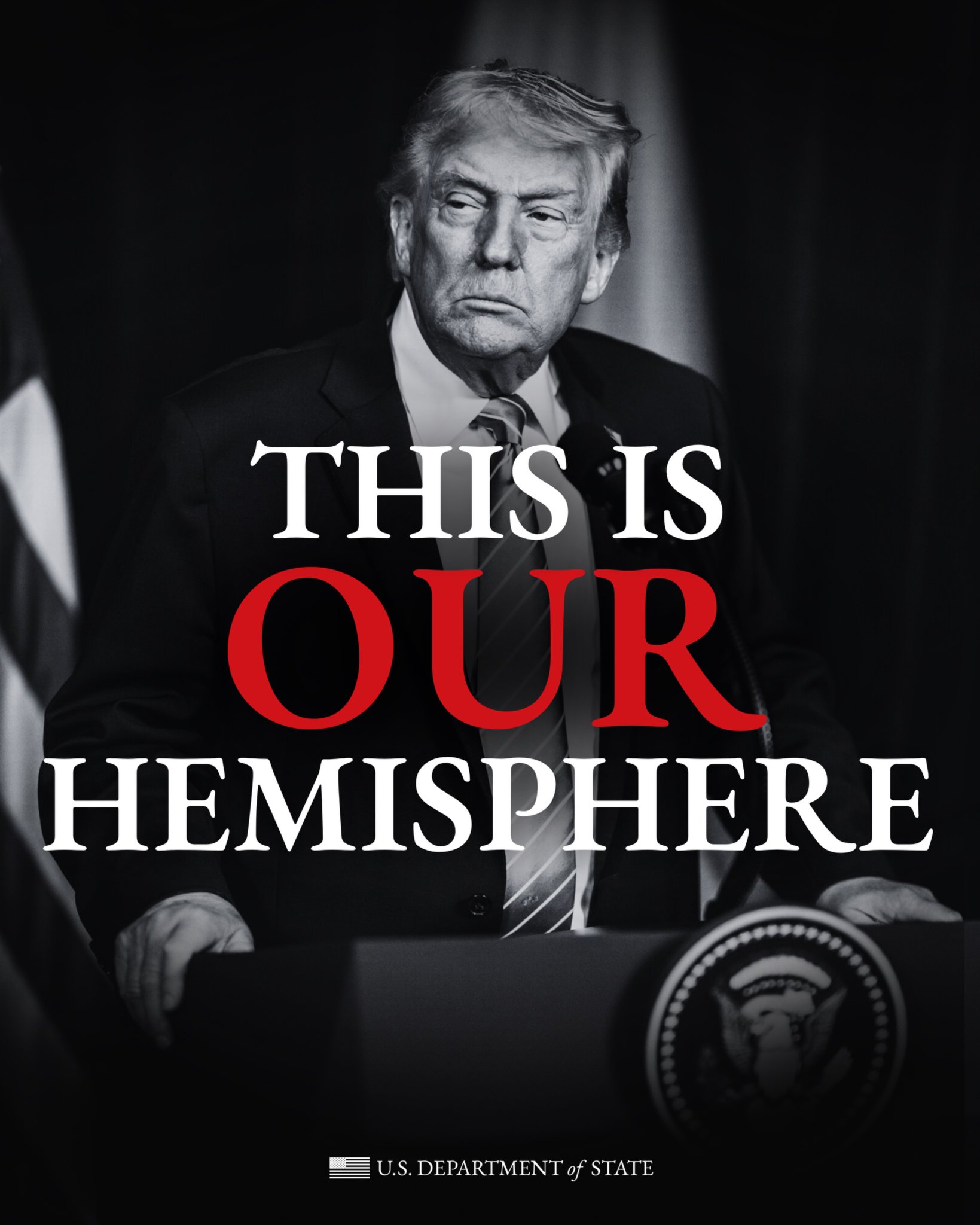El mundo en foco | columna de análisis
Donald Trump had a terrible week. On Nov. 5, his party suffered a crushing defeat in state and local elections in six states, revealing the loss of support for Trumpism. The number of days of government shutdown exceeded the historical record due to the lack of agreement to define the federal budget limit, which causes serious problems with the financing of food aid programs and employee salaries. The debt has exceeded $38 trillion, and there’s now a huge fiscal deficit financed by the issuance of Treasury bonds that cannot find buyers. And on Wednesday, the U.S. Supreme Court held its first session on the legality of the tariffs implemented by Trump since January, considered by the president to be “a matter of life and death.”
In his “front yard”, as former President Joe Biden recategorized our region, things have not gone any better. Although the U.S. government has upped its interference in blatant ways, it has not been able to bring all countries into its fold. Several have rebelled, and as a result, on Nov, 3, the Summit of the Americas scheduled for early December in the Dominican Republic under the slogan “Building a Secure, Sustainable, and Prosperous Hemisphere” had to be suspended.
The tension caused by U.S. military attacks that have killed more than 76 people in bombings of small boats allegedly carrying drugs to the United States; the exclusion of Cuba, Nicaragua, and Venezuela from the Summit, which led to the absence of Gustavo Petro and Claudia Sheinbaum; some leaders’ doubts about participating, and others’ confirmations announcing they would use the event to demand the withdrawal of the U.S. military and naval presence, were the determining factors in suspending the Summit.
Trump’s first term (2017-2021)
During his first term, Trump did not pay much attention to the region. The exception was Venezuela, where he imposed an interim president, Juan Guaidó, with more than 50 diplomatic representations and a seat at the IDB. In 2017, he created the Lima Group, which encouraged the Venezuelan Armed Forces to recognize Guaidó as president. His government confiscated CITGO refineries and gas stations in the United States, a subsidiary of the Venezuelan state oil company PDVSA, and 31 tons of gold from the Bank of England. The trio of Elliot Abrahams, Mauricio Claver Carone, and Marco Rubio were tasked with destabilizing Maduro’s government, without success. Operation Gideon, the May 2020 attempt at an armed invasion in Venezuela led by former Venezuelan military personnel and mercenaries from the United States and Colombia to overthrow Nicolás Maduro, failed.
Trump did not participate in the Summit of the Americas held in Lima in 2018, becoming the only US president to skip a summit that has brought together the region’s leaders every three years since 1994. The Summit was created by former President Clinton at the end of the Cold War. Today, the region has become a battleground for hegemonic power between China and the United States. Twenty-two of the 33 countries in Latin America and the Caribbean have signed up to the Belt and Road Initiative, through which China has invested in major infrastructure projects on several continents since 2013. Thi is why Trump is determined to take control of our region.
Second term (2025-2029)
During his second term, President Trump has stepped up his interference in Latin America and the Caribbean to displace China at all costs. As soon as he took office, he changed the name of the Gulf of Mexico to the Gulf of America. He forced Panama not to renew the memorandum of understanding signed with China in 2017 and to expel Chinese companies from the canal’s administration. Two months later, the US firm BlackRock bought the ports of Balboa and Cristóbal, at both ends of the Panama Canal, from CK Hutchison, a Hong Kong company.
Trump interfered in the Brazilian justice system by imposing tariffs of up to 50% on that country’s exports to the United States as a reaction against the trial against far-right ex president, Jair Bolsonaro. Bolsonaro was ultimately sentenced to 27 years in prison. Two weeks later, former Colombian President Álvaro Uribe (2002-2010) was found guilty in the first instance of procedural fraud and bribery and sentenced to twelve years of house arrest. Immediately, Secretary of State Marco Rubio said that “the only crime of former Colombian President Uribe has been to fight tirelessly and defend his homeland. The manipulation of the Colombian judiciary by radical judges has set a worrying precedent.”
As for Mexico, on the first day of his term, Trump declared several drug cartels in that country to be terrorist organizations, which facilitates military intervention on the grounds of U.S. national security. Trump is pressuring Mexican President Claudia Sheinbaum to authorize the entry of U.S. Army and intelligence troops to supposedly combat drug trafficking.
In late August, he added Venezuela’s Cartel de los Soles to the list or “terrorist organizations”, and on Sept, 2, he deployed warships to the Caribbean Sea off the coast of Venezuela and began attacking small boats.
Despite repeated complaints from the United Nations High Commissioner for Human Rights that such attacks constitute extrajudicial killings and that, based on the scant information provided by the United States, none of the victims of the attacked boats posed an imminent threat, Secretary of War Pete Hegseth stated, “naval attacks against narcoterrorists will continue until they cease their activities of poisoning the American people (…) To all narco-terrorists who threaten our homeland: if you want to stay alive, stop trafficking drugs. If you continue to traffic deadly drugs, we will kill you.”
The U.S. government has deployed a dozen warships, a submarine, and more than 10,000 soldiers to the Caribbean Sea off the coast of Venezuela. These troops are also stationed in Puerto Rico and Trinidad and Tobago, and the USS Gerald R. Ford, the world’s largest warship with a capacity to carry 90 aircraft, will soon be stationed there as well. When it arrives, 20% of U.S. warships deployed around the world will be in Latin American waters, according to an analysis by the specialized magazine Stars and Stripes.
President Trump also authorized the CIA to carry out covert missions in Venezuela and has said that they will enter a new phase that would include ground operations. According to a You.Gob poll, half of Americans oppose US military attacks on ground targets in Venezuela. Only a fifth support them.
He told the press that Maduro’s days at the helm of Venezuela are numbered, but then contradicted himself when he admitted that he does not believe there will be a war between the two countries. His policy of aggression got a boost on Nov. 6, when the Senate narrowinly rejected (51 to 49 votes) a bipartisan proposal to block any US military action against Venezuela that has not been approved by Congress.
Trump has yet to make clear a decision on how to proceed in Venezuela. Statements of support for Venezuela by the presidents of Russia and China must weigh heavily in his decision. During the American Business Forum in Miami, opposition leader and 2025 Nobel Peace Prize winner María Corina Machado unconditionally supported the bombing of the boats.
Colombian President Gustavo Petro has said that “Colombia will not lend its territory for any invasion of a neighboring country or any of its men.” On Oct. 19, Petro said that U.S. government officials had “committed murder and violated our sovereignty in territorial waters. Alejandro Carranza, was a fisherman with no ties to drug trafficking. The Colombian boat was adrift and displaying a distress signal.” Petro demanded accountability in the case.
Trump’s violent response was swift. He claimed that “massive drug production has become, by far, Colombia’s biggest business, and Petro is doing nothing to stop it.” He threatened intervention if Petro did not “immediately close the extermination camps” that are the drug production areas in his country. Otherwise, he threatened, the United States “will close them for him, and it won’t be pretty”. Trump went on to accuse President Petro of being a drug trafficker himself and announced the suspension of all financial and technological aid to Colombia.
In Argentina, his government intervened in the foreign exchange market through three private banks to support the peso exchange rate and announced a $20 billion loan. Earlier, Trump said that Argentines were dying and had no money, but that he would only support Argentina if they voted for Milei in the October 26 legislative elections.
The past was better
Unlike past U.S. military invasiions in Iraq, Libya, Syria, Grenada, Panama, among others, the threatening military presence of the United States in the Caribbean Sea is taking place in circumstances in which the country’s muscle has weakened.
According to the IMF, as a result of the tariffs implemented by the United States since April, growth forecasts are far from returning to 2024 levels. Inflation is one percentage point above target and the country is in a spiraling debt crisis accompanied by a chronic fiscal deficit. Unemployment has increased and consumption has fallen significantly. The long government shutdown has had an impact on some food programs, particularly the Supplemental Nutrition Assistance Program (SNAP), which covers nearly 42 million people. These have been underfunded since January 1.
On the political front, Trump was swept away in Tuesday’s elections. The victory of Zohran Mamdani in the New York City mayoral election marked a change in the nation’s political climate, not only because he did not hide his status as a socialist, a Muslim, a migrant born in Uganda of Indian origin, and a defender of the Palestinian cause, but also because voters defied Trump’s blackmail, who said that if Mamdani won, he would suspend federal aid to NYC.
On the international stage, Trump was coming off a bilateral summit with Xi Jinping in South Korea, where he attempted to extricate himself from his tariff trap by asking the Chinese leader to continue buying soybeans, so as not to undermine his midwestern electoral base, and to sell him rare earths so as not to harm U.S. industry. China accounts for around 61% of rare earth production and controls up to 92% of global processing. The two leaders signed a precarious one-year agreement.
In terms of relations with our region, the postponement of the Summit of the Americas represents a diplomatic defeat for Trump. Instead if presenting a proactive agenda rather than an imperative one, all he has done during his administration is increase intervention, destabilize the region, and threaten Mexico and Colombia and Venezuela with military presence. Especially Venezuela.

«El mundo en foco» es la columna quincenal de Ariela Ruiz Caro para Mira: Feminismos y Democracias. Ariela Ruiz Caro es economista, máster en procesos de integración económica y consultora internacional en comercio, integración y recursos naturales para la CEPAL, el Sistema Económico Latinoamericano (SELA) y el Instituto para la Integración de América Latina y el Caribe (INTAL), entre otros. Ha sido funcionaria de la Comunidad Andina, asesora de la Comisión de Representantes Permanentes del MERCOSUR y agregada económica en la Embajada del Perú en Argentina.



